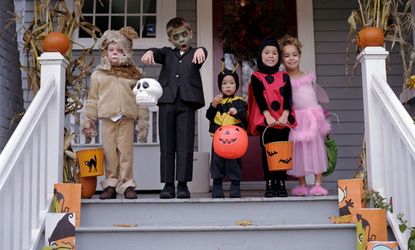Halloween should be scary, not paranoid
Unfounded fears of poisoned candies, sex offenders, and religious faux pas have been a real buzzkill

Move over War on Christmas; Halloween is waging the real battle. We have somehow managed to suck the joy out of the most fun day of the year. And if you can’t revel in babies dressed up as Chipotle burritos or carte blanche sugar consumption, then our country has taken a wrong-turn.
The outrageous costumes that make us question humanity’s sense of common decency are already well-documented. But it’s not just our offensive lack of judgment that’s bringing down the holiday; we’ve become too paranoid to actually celebrate and enjoy it.
To be fair, our neuroticism has been growing steadily for decades. In 1970, Judy Klemsrud at the New York Times reported that "Halloween may be hazardous to your children’s health," citing fears that "bubble gum may be sprinkled with lye, popcorn balls may be coated with camphor, the candy may turn out to be packets containing sleeping pills." And with that, the urban myth of razor blades in apples and poisoned candy was validated and allowed to metastasize.
Subscribe to The Week
Escape your echo chamber. Get the facts behind the news, plus analysis from multiple perspectives.

Sign up for The Week's Free Newsletters
From our morning news briefing to a weekly Good News Newsletter, get the best of The Week delivered directly to your inbox.
From our morning news briefing to a weekly Good News Newsletter, get the best of The Week delivered directly to your inbox.
In her new book Candy: A Century of Panic and Pleasure, Samira Kawash debunks those fears of tainted treats. The myths lived on, she writes, because they "played a part in the persistence and popularity of the Halloween sadist legend." Along with the innocent joy of Halloween, she explains, is the fear that the worst members of society will use the holiday to take advantage of the most vulnerable.
That's why, in the 21st century, unfounded fears of tainted candy have grown into an abnormal paranoia regarding sex offenders.
With a name more befitting of an al Qaeda raid than a holiday with fun size Snickers, New York state launched "Operation Halloween: Zero Tolerance," a strict monitoring of sex offenders that forbids them from wearing masks or costumes or answering their door to trick-or-treaters.
In Montana, there is "trunk-or-treat," Emily Horowtiz explains at The Huffington Post, which lets "kids get Halloween candy from trunks of cars in parking lots to avoid potential danger."
Sign up for Today's Best Articles in your inbox
A free daily email with the biggest news stories of the day – and the best features from TheWeek.com
These and the many other sex offender precautions would be justified if any data supported a link between molestation by strangers and Halloween. But there isn’t. Horowtiz adds that there is "no evidence of increased sex abuse on Halloween and no evidence that a child was ever a victim of sexual abuse by a stranger while out-trick-or-treating."
But sex offenders poisoning candy is not the only thing spooking concerned citizens; some are just as worried about the fat content of those treats.
Instead of giving sweets to all trick-or-treaters, one lady in Fargo, N.D has deemed "moderately obese" children as too fat for candy. As a helpful neighbor, she has also decided that they and their parents should be ostracized with a disapproving letter.
Her note includes the admonishing words "My hope is that you will step up as a parent and ration candy this Halloween and not allow your child to continue these unhealthy eating habits."
While the nation is clearly dealing with a childhood obesity problem, take it from a former fat kid: Making us feel fat and different doesn’t get us to start eating healthy or feeling better about ourselves.
Of course, for every person ruining Halloween because she’s a self-righteous arbiter of sugar, there are those who ban the holiday with good intentions.
Take, for example, the two elementary schools in Pennsylvania that banned Halloween celebrations because of vague concerns about safety and peanut allergies. Or, there's the school in Ontario that replaced Halloween with "a more inclusive Spirit Day," so as not to alienate anyone or make children who can’t afford fancy costumes feel bad.
Jesse Kline at Canada’s National Post wrote the right response: "Although it’s not always clear where the line between being sensitive to cultural minorities and being a party-pooper lies, it would behoove school administrators to remember that it is not their job to take all the fun out of growing up."
In fact, it would behoove all of us. Somewhere between Julianne Hough's blackface costume and getting sheriff-approved candy from parking lots, there needs to be a happy medium. And it all boils down to fear: We need to stop being scared of the wrong things — poisoned candies, sex offenders, potentially pagan rituals — and start being scared of the right ones — werewolves, witches, and blood-curdling ghosts.
Emily Shire is chief researcher for The Week magazine. She has written about pop culture, religion, and women and gender issues at publications including Slate, The Forward, and Jewcy.
-
 The real story behind the Stanford Prison Experiment
The real story behind the Stanford Prison ExperimentThe Explainer 'Everything you think you know is wrong' about Philip Zimbardo's infamous prison simulation
By Tess Foley-Cox Published
-
 Is it safe for refugees to return to Syria?
Is it safe for refugees to return to Syria?Talking Point European countries rapidly froze asylum claims after Assad's fall but Syrian refugees may have reason not to rush home
By Richard Windsor, The Week UK Published
-
 Quiz of The Week: 14 - 20 December
Quiz of The Week: 14 - 20 DecemberHave you been paying attention to The Week's news?
By The Week Staff Published